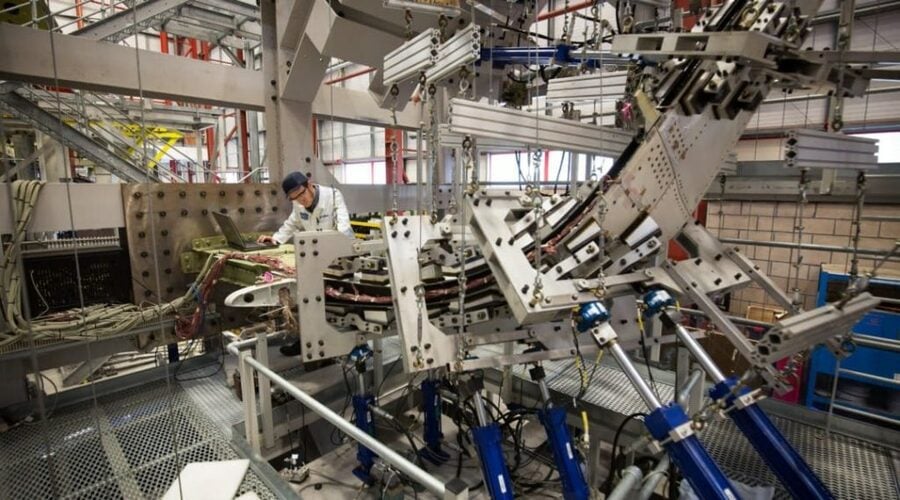A typical airframe fatigue test is divided in a number of fatigue load blocks. At the end of each flight block the test is stopped and the specimen is inspected for cracks. These manual inspections are time consuming and the time interval between these inspections is relatively large. Structural abnormalities may be detected too late, which could lead to retrofitting in-service aircraft in a worst-case scenario. Condition Based Inspections (CBI) of the specimen, instead of Risk Based Inspections (RBI), is a potential solution to reduce the total fatigue test duration and to quickly detect abnormalities. One of the implications is that more sensors are required to monitor the behaviour of the test specimen and to detect or predict structural failures.
“A full-scale airframe fatigue test can generate data at rates of up to 10 MB/s,
totalling to hundreds of terabytes at completion.
Data processing and analysis is a major bottleneck.”
Gantner Instruments has developed an innovative software platform, called GI.cloud, aimed at efficient processing of large volumes of measurement data and rapid analysis. GI.cloud combines a time series database management system with a powerful stream processing engine, offering a number of distinct advantages.
- Minimise your investment cost for IT and storage infrastructure in the test lab, whilst maintaining the necessary computing performance for test-critical data analysis tasks. Measurement data that you need to accessed right away (hot data) is available in the database. Data that you access less frequently, and is only needed for auditing or bookkeeping purposes (cold data), is kept in the stream processing platforms.
- Raw measurement data is safely stored in redundant, fault-tolerant clusters for automated backup. Flexible data aggregation ensures that your measurement data is continuous logged to the database at low sample rate. The database can replay the same data and store it at a higher sample rate in case detailed analysis around an unexpected event or specimen failure is required.
- Powerful querying capabilities enable you to analyse large amount of measurement data on-the-fly. Trend monitoring over the entire life of the fatigue test will quickly identify any significant change in strain between repetitive load conditions. Fatigue prediction and crack probability algorithms can identify possible loss of structural integrity during the test and immediately inform you when deviations occur.
Contact your local sales representative to learn more about GI.cloud.

More articles
Introducing GI.bench – Enhanced DAQ Capabilities for Engineering Excellence
Take Your Data Acquisition to the Next Level
Engineers and technicians frequently encounter significant challenges in managing complex data acquisition setups, including massive data volumes, the integration of diverse devices, and the requirement for real-time insights. Addressing these challenges head-on, Gantner Instruments proudly announces the latest evolution of our industry-leading software, GI.bench.
Korea Aerospace Industries selects Gantner Instruments for Structural Testing
Korea Aerospace Industries (KAI) has selected the Q.raxx slimline DAQ system from Gantner Instruments for static strength and fatigue evaluation testing of the LCH/LAH helicopter airframe, main landing gear, and engine mount structure.
Read more...The Aerospace Test & Development Show 2024
Join us from 10th to 11th September 2024 in Toulouse at the Aerospace Test and Development Show 2024 at booth 419. Register here for your free exhibition pass.
Read more...The Aerospace Test and Development Show 2023
Join us from 19-20 September 2023 in Toulouse at The Aerospace Test and Development Show 2023 at booth 332. Register here for Your free exhibition pass.
Read more...